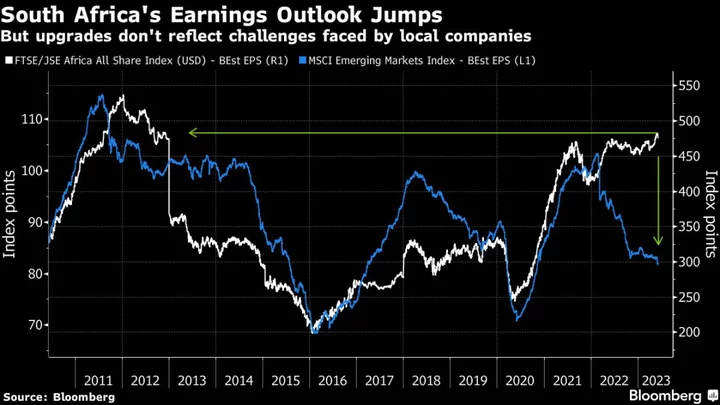Analysts have raised the earnings outlook for South Africa’s main equity index to an almost 11-year high. Money managers say that’s a red herring.
The average forecast for 12-month profits in the FTSE JSE Africa All Share Index rose as much as 4% in dollar terms this year through May 31 to the highest level since 2012. It also hit a record high in local-currency terms. The upgrades came even as the estimate for emerging-market stocks as a whole fell 1.4%.
But due to a quirk in the South African benchmark, which includes many foreign companies, the profit projections lean heavily on growth prospects outside the country — ranging from luxury goods sales in Asia to digital commerce in Europe. Some smaller earnings upgrades reflect a rally in gold. Beyond this positive facade, South Africa’s economy remains crippled by energy shortages and elevated inflation, said Ashish Chugh, a money manager at Loomis Sayles & Co. in Boston.
“This analyst optimism is misplaced and embeds higher-than-reasonable expectations for recovery from the severe electricity rationing that’s been hitting the economy for the past two years,” Chugh said in emailed comments. “We are less sanguine on the outlook for domestic earnings recovery in South Africa and expect incremental downgrades from here.”
South Africa has faced rolling blackouts as the heavily indebted state-run energy utility struggles to keep its aging fleet of power stations operating. Meanwhile, inflation is running well above the central bank’s target range, prompting it to more than double its benchmark rate to 8.25% in two years in a further constraint on the economy. The South African Reserve Bank cut its economic growth outlook for 2023 to 0.3%, while the International Monetary Fund projected a 0.1% expansion.
Chugh said companies with businesses abroad and that don’t depend on the domestic economy account for almost half of the main Johannesburg equity index by weight. Much of the market’s limited investment appeal comes down to these stocks, but they are a bet on select corners of the global economy, rather than on South Africa.
Richemont, the Swiss luxury conglomerate, is the single-biggest stock in the South African index, with a weighting of about 19%. Earnings projections for the Cartier owner have climbed 16% this year, pushing them to a record high in data going back to 2005.
Other foreign companies such as Amsterdam-based tech investor Prosus NV and British American Tobacco Plc have also had their earnings outlook upgraded. And estimates have been raised for Gold Fields Ltd., Harmony Gold Mining Co. and DRDGold Ltd., helped by bullion’s 7.7% advance in 2023.
Meanwhile, earnings expectations for most locally focused companies have been heading lower.
“Over the last few months, a divergence in earnings expectations has been developing,” said money managers Hannes van den Berg and Rehana Khan at the Ninety One Equity Fund. “Concerns around disruptive electricity supply as well as tighter monetary conditions have seen expectations for SA Inc. companies moderating.”
READ MORE: How South Africa’s Blackouts Went From Bad to Worse: QuickTake
This year’s 5.3% gain in the Johannesburg benchmark index has been almost entirely driven by companies with their primary listings abroad, leaving locally focused firms lagging behind. Zurich-traded Richemont’s more than 30% surge accounts for 90% of the gauge’s performance, followed by the gold companies with smaller contributions.
Money managers predict index-level gains to wind down this year.
“Sustaining the recovery is likely to be challenging until the South African Reserve Bank starts to cut interest rates, loadshedding is significantly reduced, the economy returns to real growth and the global macro environment becomes more supportive,” said Peter Takaendesa, the head of equities at Mergence Investment Managers in Cape Town. “We do not forecast short-term returns for the equity market, but focus on finding quality business that trade at cheaper valuations compared to our assessment of their long term intrinsic values.”

